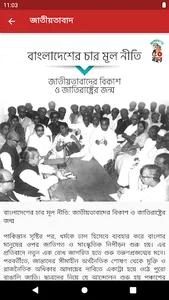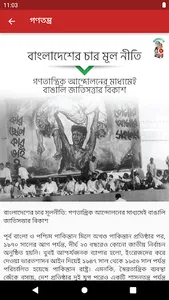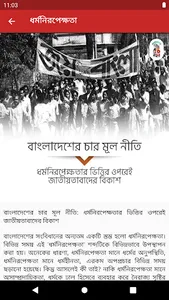The four principles of Bangabandhu and the four pillars of Bangladesh
The advent of Sheikh Mujibur Rahman is the biggest event in the history of Bangladesh. Bangabandhu's achievement is not limited to the establishment of a non-communal independent state based on language. In political history, he is as brilliant as the hero of fairy tales. Matsini and Garibaldi in Italy, George Washington in the United States, and Mahatma Gandhi in India; Bangabandhu Sheikh Mujibur Rahman is such a great hero for the independence of Bangladesh. His main goal was to bring stability to the people of the country by enacting a new constitution after independence.
The main goal of Bangabandhu in achieving independence was to break the political, socio-economic and cultural structure of the old Pakistani rule. And the politics of the miserable and hardworking people, the socialist economy in the interest of the masses, the realization of the golden Bengal of dreams through the establishment of the culture of one's own country. That is why Bangabandhu used to say, 'We want democracy of exploitation, we do not want democracy of exploiters.' Bangabandhu used to understand democracy by exploitation which is for the exploited people. In the interest of the exploited people and governed by them. Especially the peasant-workers, the miserable-hardworking people so that no one can exploit them. Bangabandhu emphasized on national unity as the primary basis for building a golden Bengal free from exploitation. Bangabandhu was adamant on the question of building national unity among the backward and neglected masses and patriotic individuals, parties and forces in a class-divided society.
In early 1982, the Awami League leaders started propagating a new ideology of the party. Nationalism, democracy, socialism and secularism declared by Bangabandhu - this theory based on this state principle is called Mujibism. In a nationwide campaign of Mujibism, the Awami League leaders and activists declared that the aim of this theory was to unite the Bengali nation.
Bangabandhu's explanation of Mujibism was as follows: I can only say what I understand about what has been termed as Mujibism. First of all, I believe in democracy. Along with the belief in democracy, I firmly believe that the development of democracy is possible only in a society free from exploitation. That is why I am talking about democracy and socialism. I also believe that all religions in Bangladesh will have equal rights. I mean secularism, freedom of religion. In the end, the most important thing is the need to inspire Bengali culture, language, culture and the whole Bengali environment. What I call nationalism. (Source: Constitution of the People's Republic of Bangladesh, Proposal)
On 16 and 17 February 1972, the first meeting of the central executive parliament of the ruling Awami League was held in independent Bangladesh under the leadership of Bangabandhu. The meeting elected Bengali nationalism, democracy, secularism and socialism as the state principles. It was promised to build an independent Bangladesh on the basis of these four principles.
The constitution of Bangladesh has also laid down some basic principles of the state. The preamble to the great constitution of Bangladesh states that the great ideals or consciousness which inspired our heroic Bengali nation to devote themselves to the national liberation struggle and sacrifice the lives of heroic martyrs are - nationalism, socialism, democracy and secularism and secularism will be the principles of this great constitution. The second part of the original constitution of 1972 contains the principles of governing the state from Article 6 to Article 25.
The advent of Sheikh Mujibur Rahman is the biggest event in the history of Bangladesh. Bangabandhu's achievement is not limited to the establishment of a non-communal independent state based on language. In political history, he is as brilliant as the hero of fairy tales. Matsini and Garibaldi in Italy, George Washington in the United States, and Mahatma Gandhi in India; Bangabandhu Sheikh Mujibur Rahman is such a great hero for the independence of Bangladesh. His main goal was to bring stability to the people of the country by enacting a new constitution after independence.
The main goal of Bangabandhu in achieving independence was to break the political, socio-economic and cultural structure of the old Pakistani rule. And the politics of the miserable and hardworking people, the socialist economy in the interest of the masses, the realization of the golden Bengal of dreams through the establishment of the culture of one's own country. That is why Bangabandhu used to say, 'We want democracy of exploitation, we do not want democracy of exploiters.' Bangabandhu used to understand democracy by exploitation which is for the exploited people. In the interest of the exploited people and governed by them. Especially the peasant-workers, the miserable-hardworking people so that no one can exploit them. Bangabandhu emphasized on national unity as the primary basis for building a golden Bengal free from exploitation. Bangabandhu was adamant on the question of building national unity among the backward and neglected masses and patriotic individuals, parties and forces in a class-divided society.
In early 1982, the Awami League leaders started propagating a new ideology of the party. Nationalism, democracy, socialism and secularism declared by Bangabandhu - this theory based on this state principle is called Mujibism. In a nationwide campaign of Mujibism, the Awami League leaders and activists declared that the aim of this theory was to unite the Bengali nation.
Bangabandhu's explanation of Mujibism was as follows: I can only say what I understand about what has been termed as Mujibism. First of all, I believe in democracy. Along with the belief in democracy, I firmly believe that the development of democracy is possible only in a society free from exploitation. That is why I am talking about democracy and socialism. I also believe that all religions in Bangladesh will have equal rights. I mean secularism, freedom of religion. In the end, the most important thing is the need to inspire Bengali culture, language, culture and the whole Bengali environment. What I call nationalism. (Source: Constitution of the People's Republic of Bangladesh, Proposal)
On 16 and 17 February 1972, the first meeting of the central executive parliament of the ruling Awami League was held in independent Bangladesh under the leadership of Bangabandhu. The meeting elected Bengali nationalism, democracy, secularism and socialism as the state principles. It was promised to build an independent Bangladesh on the basis of these four principles.
The constitution of Bangladesh has also laid down some basic principles of the state. The preamble to the great constitution of Bangladesh states that the great ideals or consciousness which inspired our heroic Bengali nation to devote themselves to the national liberation struggle and sacrifice the lives of heroic martyrs are - nationalism, socialism, democracy and secularism and secularism will be the principles of this great constitution. The second part of the original constitution of 1972 contains the principles of governing the state from Article 6 to Article 25.
Show More





